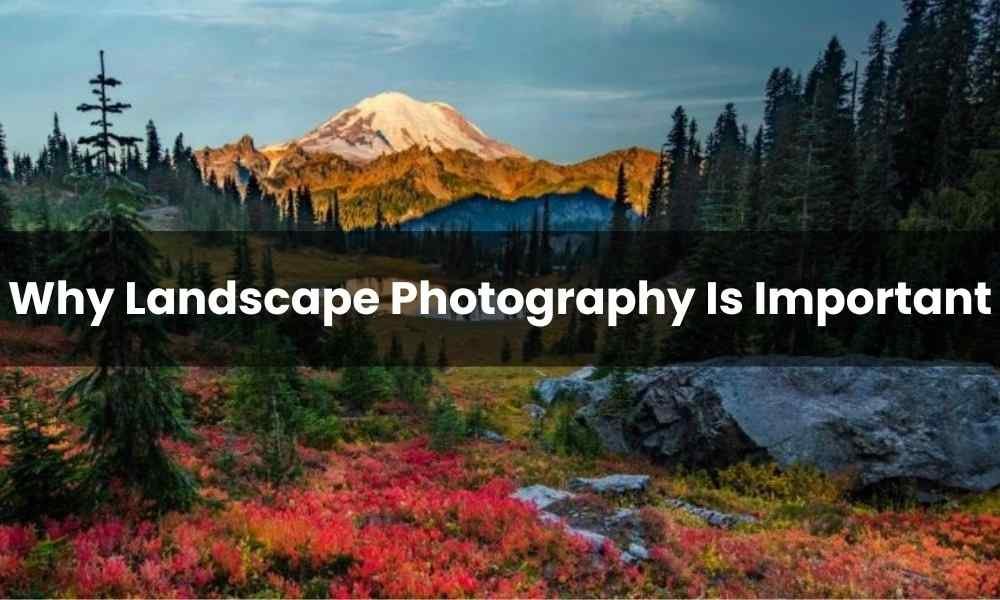Landscape Photography stands out as a powerful form of visual storytelling. Beyond its aesthetic appeal, it plays a vital role in preserving memories, raising environmental awareness, and inspiring others to connect with nature.

What is Landscape Photography?
Landscape photography captures the beauty of our natural world in a single frame. It is a form of art that allows us to freeze moments in time and showcase the grandeur of nature’s wonders. Through landscape photography, photographers aim to convey the emotions and essence of a particular scene, whether it’s a breathtaking mountain range, a serene lake at sunset, or a vast desert under the starry night sky.
Preserving Memories
At its core, landscape photography is about capturing moments in time. Whether it’s a breathtaking sunset over a mountain range or a serene lake nestled in a forest, these images serve as tangible reminders of our experiences in nature. Each photograph tells a story, evoking emotions and memories that transport us back to the moment it was taken.
Environmental Awareness
Landscape photographers have a unique opportunity to highlight the beauty of the natural world and the importance of preserving it for future generations. By showcasing landscapes in their pristine state, photographers can raise awareness about environmental issues and inspire action to protect fragile ecosystems.
Emotional Impact
One of the most compelling aspects of photography is its ability to evoke emotions in viewers. Whether it’s a sense of awe at the grandeur of a mountain range or a feeling of tranquility in a tranquil forest scene, these images have the power to stir the soul and forge a deep connection with nature.
Artistic Expression
Landscape photography is not just about capturing what is seen but also about interpreting it in a unique and creative way. Photographers use composition, lighting, and perspective to create stunning images that transcend mere documentation and become works of art in their own right.
Documentation of Change
Over time, landscapes change due to nature and human activities. Photography captures these transformations, highlighting environmental issues and promoting conservation efforts.
Promotion of Tourism
Landscape photography plays a crucial role in promoting tourism and showcasing the beauty of different destinations. Stunning images of iconic landmarks and natural wonders can attract visitors and encourage them to explore new places, benefiting local economies and fostering appreciation for cultural and natural heritage.
Inspiration for Others
Landscape photography inspires people to appreciate and explore nature. Photographers’ images spark curiosity and adventure, encouraging viewers to go outdoors and discover the world’s beauty.
Cultural Significance
Landscape photography captures the beauty and cultural significance of regions. It documents traditions, architecture, and cultural events, preserving heritage and fostering cross-cultural understanding.
Educational Tool
Landscape photography serves as an educational tool, allowing viewers to learn about geography, geology, and ecology. Through stunning images, photographers can teach people about different ecosystems, habitats, and geological formations, fostering a deeper appreciation for the natural world.
Benefits of landscape photography
Spending time in nature has been shown to have numerous therapeutic benefits, from reducing stress and anxiety to improving mood and overall well-being. Landscape photography provides a means of immersing oneself in natural beauty, offering a sense of peace and tranquility amidst the chaos of modern life.
Connection with Nature
Landscape photography helps people reconnect with nature by bringing the beauty of the outdoors into their homes.
Celebration of Diversity
From mountains to forests, deserts to coral reefs, our world brims with diverse landscapes, each unique and waiting to be explored. Landscape photography captures this richness, inspiring awe and appreciation.
Professional Opportunities
Landscape photography opens up many career opportunities for aspiring photographers. You can sell prints, license images, teach workshops, and lead photography tours to build a rewarding career.
Stress Relief:
Spending time outdoors and capturing scenic landscapes can provide a sense of calm and relaxation, serving as a form of stress relief from the pressures of daily life.
Creativity and Self-Expression:
Landscape photography provides an outlet for creative expression, allowing photographers to experiment with composition, lighting, and perspective to convey their unique vision of the world.
Physical Exercise:
Exploring different landscapes often involves physical activity such as hiking or walking, contributing to improved physical health and overall well-being.
Mindfulness:
The act of photographing landscapes encourages mindfulness, as photographers focus on the present moment and immerse themselves fully in their surroundings.
Appreciation for Beauty:
Through the lens of a camera, individuals develop a heightened appreciation for the beauty of the natural world, noticing intricate details and subtle changes in light and color.
Documentation of Memories:
Landscape photographs serve as tangible reminders of outdoor adventures and memorable experiences, allowing individuals to revisit and relive those moments whenever they view the images.
Environmental Awareness:
By capturing and sharing images of pristine landscapes, photographers can raise awareness about the importance of environmental conservation and inspire others to protect natural habitats.
Community Engagement:
Landscape photography often brings together like-minded individuals who share a passion for nature and photography, fostering a sense of community and camaraderie among enthusiasts.
Exploration and Adventure:
Photographing landscapes encourages exploration of new places and hidden gems, leading to exciting adventures and discoveries in the great outdoors.
Conclusion
Landscape photography goes beyond hobby or profession—it’s visual storytelling that inspires, educates, and connects people with nature. Photographers preserve memories, raise environmental awareness, and promote appreciation by capturing and sharing natural beauty
Unique FAQs
Is landscape photography only about capturing natural landscapes?
While natural landscapes are a common subject in landscape photography, it can also include urban landscapes, seascapes, and even abstract interpretations of the environment.
Do I need expensive equipment to start landscape photography?
While high-quality equipment can certainly enhance your photography, you can still capture stunning landscapes with basic gear. The most important factors are creativity, patience, and a keen eye for composition.
How can I improve my landscape photography skills?
Practice is key to improving any skill, so make sure to get out into nature regularly and experiment with different techniques. Additionally, studying the work of other photographers and seeking feedback from peers can help you refine your craft.
What role does post-processing play in landscape photography?
Post-processing software allows photographers to enhance their images, adjusting colors, contrast, and sharpness to create the desired effect. However, it’s important to use post-processing judiciously and avoid over-editing, which can detract from the natural beauty.


